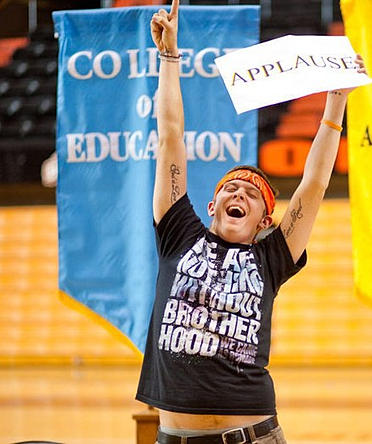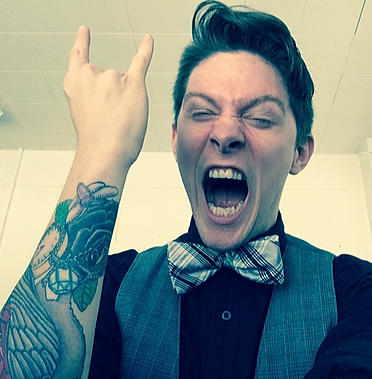The role of vulnerability & insecurity in 1) surviving life and 2) in the realm of interviewing in Higher Education
I had already started writing this blog post
when this topic was announced, so I was excited to get to work on the #SAChat
live-tweet forum—however, I ultimately came back to what I had written and
deleted everything.
I wasn’t confident in what I had written.
I was trying too hard to say the right things
to make myself sound like an “authentic” future student affairs
professional—when in reality, I was just saying what I thought I was supposed
to be saying.
Intentional this, social justice that;
self-care this, engagement that.
I wasn’t being authentic.
Authentic!—there’s the word of the week.
The contradiction I saw throughout the #SAChat
conversation last week was that people didn’t seem to understand what it really
meant to be “authentic” in the context of vulnerability. Nor did I—until I
thought further about it throughout the day, into the weekend, and on my long
drive to/from Providence for some rasslin on Sunday.
The answer I arrived at was simply that we are
different people in different situations. And that’s okay. We don’t need
to be ourselves all of the time. Regardless of how you put it, or if you’re even
willing to admit it—we are not truly authentic all of the time.
I will say that one more time:
We. Are not. Truly. Authentic. All of the
time.
We hide. We hide a lot of ourselves. Often.
We hide behind fake smiles when we’re having a
tough day.
We hide behind social media profile pictures.
We hide our love of professional rasslin
because it may make us look like a weirdo.
We hide. Often.
At least I know I do.
And maybe I’m alone in this. Maybe I’m the
only one hiding.
If that’s true, then I guess there’s no real
need to continue reading this week!
But I’d like to think that this is a common mind
game we play with ourselves in student affairs. We can’t truly unleash all of
ourselves all of the time—that’d be too much for anyone to handle. That’d be
too much for us to handle.
I can be authentic with my friends, with my
family, with some colleagues—but in some situations, I am not me. I am
generally an extroverted person with a lot of opinions; but in some mixed
company, I shrink up, quiet down, and withdraw. I am often an oversharer, but
there are situations where I force myself to actually withhold information from
someone so that they do not view me in a negative or unappealing light.
It’s fear. And as Charles Bukowski simply
stated, “we are afraid.” We are afraid of being ourselves because we are afraid
of what others might think.
 |
| Even I can have a little bit of a dark side. |
I don’t think it is a bad thing to be insecure.
Our students are insecure—our students also aren’t perfect. We are insecure—and
coincidentally, we aren’t perfect, either. And that’s okay—that’s where
authenticity thrives!
Authenticity thrives in the vulnerability of
recognizing your insecurities can be used to motivate you beyond your fears.
Obviously this isn’t an easy task and it took
me learning about my own fears and faults—and through a few bouts of depression
and anxiety—to be able to acknowledge this motivation; and now—thanks to the support of friends, family, and a lot of
willpower—I can acknowledge that what may make me feel insecure in one moment,
will serve as a defining source of strength in the future.
It reminds me of my favorite La Dispute lyric—“if
my fear has kept me here, only my fear can set me free.”
I—like many current and potential #SAGrad
students—have become quickly inundated with interviewing for summer
internships. Interviews are situations where someone is most vulnerable at a
time when they are supposed to be their most authentic self.
I find there is a fair amount of compromise of
character and authenticity when interviewing. It’s terrifying to think about it
like this, but we are selfish in our desire to be accepted into a new position
that we desire so dearly that we compromise our values in order to seem like
the perfect person for the job.
Now, in many ways I am authentic in interviews
because I truly am eager to learn more. I am eager to try out a new position in
a new environment—hell, I moved 3,000 miles for my grad school experience. That kinda shows some dedication. And honestly, I do have a lot of fun when I interview because
I know that interviewers have to sit through so many candidates that it can
probably get a boring or restless—so I try to keep things interesting.
Yet, some of my withdrawal in interviews comes
from the fear of saying the wrong thing at the right time.
Does that make sense?
I’ve been on the other side of the equation,
where I was interviewing people for a position and they said something that
triggered me in just the wrong way at just the wrong time—it might’ve been a
single word, a turn of phrase, or simply a tone of voice—regardless, I wasn’t
impressed.
Maybe I was being too sensitive at the time,
but that’s the fear that is constantly running through my head as I
interview—especially as an oversharing extrovert with too much eccentric energy
for one phone call or Skype interview to handle. Interviews are sensitive matters where lots
of words are said and many words are left unsaid—so the inner dialogue often
takes over more often than not.
Am I being
honest? Am I being pretentious?
Did I already
say that? Am I being me?
Am I talking
too much? Am I talking too little?
What was the
question again?
Interviews are a necessary—and yet,
frustratingly sensitive and vulnerable—aspect of our field. So the fear of the
inner dialogue taking over is justified because our brains want to remind us of
all of the things we practiced five minutes before the phone call and that can
withdraw from our authenticity because we are not thinking fully about each
question.
Instead, we try to answer the questions that
weren’t asked.
I hope this post made sense.
I hoped to draw on the ideas of authenticity
in a vulnerable way.
Maybe it worked. Let me know your thoughts!
Hope all is well.
- Craig.
Want to continue the conversation?
Find me on Twitter at @CrigBididman





